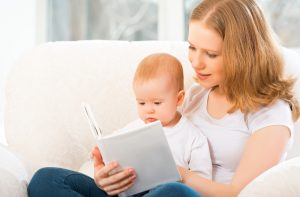 Should you really start reading to your baby when she’s a newborn? She doesn’t even know what you’re saying!
Should you really start reading to your baby when she’s a newborn? She doesn’t even know what you’re saying!
No matter, say child development experts. Reading to an infant, even a brand-new one, is valuable. And the earlier you introduce your baby to the world of books, the more she will reap the many benefits of reading.
|
Highlights:
|
Let’s look at some of the benefits of reading to your infant:
Future Academic & Career Success
Your little one going to school and starting her first job may seem a long way away, but reading to her now can set her up for academic and career success later. Worldwide research tells us that reading to very young children is linked to superior academic performance in high school. In the U.S., reading level in third grade is the number-one predictor of graduating from high school and succeeding in the workforce. The fact that two-thirds of American third graders lack adequate reading skills has led to a push by organizations like the AAP and BookTrust to get more children reading more books as early as possible.
Brain Development
Being held and listening to you read (even before she understands what you’re saying) stimulates neurons in your baby’s rapidly-developing brain. Neural stimulation during the first years of life lays the foundation for all future development and success in every area of life.
Bonding
A warm, trusting bond with parents and caregivers is at the root of optimal development and is linked to numerous positive outcomes.
Experts recognize that reading to an infant promotes bonding in a few key ways, including encouraging physical closeness and creating positive feelings. We also know that the sound of a familiar voice (especially mom’s) is soothing to babies, and story time is prime time to hear that favorite sound!
Language Development
Thanks to fascinating research, we know that language learning begins in the womb. Newborns can recognize the language their mother spoke during pregnancy, and even cry with a corresponding accent!
When your baby listens to you read, dynamic language learning continues. Here are some of the reasons why:
She hears speech patterns. Before she begins to grasp the meanings of words, story time teaches your baby about other, equally important aspects of talking, like rhythm, tone and inflection. You will hear her practicing these when she babbles.
She hears a lot of words. This landmark study showed that infants who hear more words go on to have superior language skills and academic success. It’s a good idea to talk to your baby as often as possible from day one, and reading is an easy way to up the words she hears. It also exposes her to new words she may not hear in day-to-day conversations.
She learns vocabulary. When it comes to your little one’s vocabulary, there are two types: Expressive vocabulary (the words she says) and receptive vocabulary (the words she understands). By the time she starts talking, she already understands an impressive number of words. In fact, a 12-15 month-old can understand up to 100 words! Reading is one of the best ways to teach vocabulary because you’re labeling things your baby sees in pictures. Reading the same books again and again reinforces her understanding of what words mean.
Social and Emotional Development
Early on, your infant can pick up on different emotions in the tone of your voice as you read. Reading becomes increasingly social as she gains skills to point, turn pages, and express emotion. As she reaches her first birthday, she becomes interested in simple storylines of baby books, which often involve social and emotional themes.
Now that we’ve convinced you to read to your infant, here are tips for how to do it!
Up next: Toddlerhood, when your little one will benefit from reading with you in similar but more complex ways.








